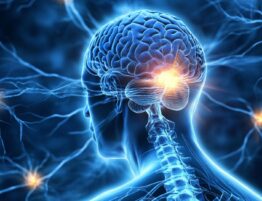Every day, people encounter stress and unpleasant situations. These stressful situations can lead to serious neurological conditions. Today, post-traumatic stress disorder (PTSD) is a fairly widespread problem. PTSD affects both psychological well-being and neurological functioning. This condition impacts mood regulation, self-esteem, and overall mental health. Neurological function is disrupted, affecting emotional regulation. This condition alters brain function and significantly impacts daily functioning. It is difficult for a person to cope with various emotions caused by anxiety and stress.
The brain remains in a state of heightened stress. This ongoing stress response damages mental health, leading to serious problems. A person can experience many symptoms that negatively affect their life. Persistent negative mood, intrusive memories, and impaired impulse control are key symptoms that significantly impact a person’s well-being. When experiencing these symptoms, seeking professional medical help is essential. To restore health and improve overall mood, it is important to undergo therapy. Our quality of life depends on brain health, making it crucial to prioritize neurological well-being.
The Link Between Trauma and Neurological Function
Lone Star Neurology provides help to people in need. We provide high-quality care and treat neurodegenerative diseases. Our team has extensive experience and will help maintain and improve brain health. Today, many people suffer from post-traumatic stress disorder, which affects their quality of life. Traumatic experiences can cause serious neurological changes and health conditions. This trauma can severely damage brain structures and functions. Trauma has profound effects on neurological function, significantly altering how the brain works. Here is what is affected:
- Amygdala. Trauma caused by a bad experience increases activity in the brain. Individuals may experience heightened anxiety and frequent fear responses. They often perceive threats even in safe situations and may live under persistent stress. Beyond fear, individuals often experience intensified emotional memories, particularly negative ones.
- Hippocampus. Trauma can significantly reduce hippocampal volume. Individuals may struggle to recall past events and create new memories. Many report feeling disoriented in time and struggle with persistent negative thoughts. It is difficult for a person to remember a pleasant experience from the past.
- Prefrontal cortex. After trauma, people often have difficulty making decisions. They struggle to regulate emotions effectively and may suppress natural reactions. Often, a person faces problems with concentration and forming their thoughts.
These neurological disruptions affect serotonin production and increase stress hormone release. Individuals typically experience persistent anxiety and intense negative emotions. Many struggle to regulate emotions and access positive memories. Treatment is essential for improving emotional well-being in these situations.
What Happens to the Brain During PTSD
Treating both neurological and psychological symptoms is essential for recovery. The brain undergoes changes during post-traumatic stress disorder. These changes pose significant problems for a person during their life. Harmful neurobiological processes are triggered in the brain. Neurobiology examines how these neurological changes impact overall health. Here’s what happens:
- Increased cortisol levels. During negative emotions and depression, the stress hormone is released. Cortisol affects overall well-being and contributes to destructive processes in the brain. Individuals may experience chronic stress and persistent fear. Trauma keeps the brain in a heightened state of alertness. This can impair a person’s ability to accurately assess danger and respond to problematic situations. Elevated or low cortisol levels have a serious impact on the brain.
- Changes in brain circuits. Post-traumatic stress disorder causes hyperactivity of the amygdala. Individuals become hypersensitive to potential threats and dangers. People with PTSD often struggle to manage their condition and live with heightened anxiety. Trauma leads to a reduction in the hippocampus, which is characterized by poor memory. It is difficult for a person to process information and recall pleasant memories. There is a weakening of the prefrontal cortex due to reduced activity. It is difficult for a person to control emotions and respond correctly to fear. These mental health changes lead to sleep problems, chronic stress, and difficulty concentrating.
Long-Term Brain Health Effects of PTSD
PTSD has a significant and long-term impact on brain health. A person experiences major disruptions in memory, concentration, and overall well-being. They experience cognitive impairment, changes in brain structure, and ongoing stress. The risk of neurodegenerative diseases also increases. Here is key information about the impact of PTSD on brain health:
- Cognitive decline. People with PTSD often experience declining memory function, slower information processing, and reduced concentration abilities. Information processing becomes slower and more difficult. Chronic stress may accelerate brain aging processes. Neural overstimulation contributes to impaired decision-making abilities.
- Increased risk of neurodegenerative diseases. Brain health deteriorates due to an increased risk of neurodegenerative diseases. Chronic stress can cause Alzheimer’s disease and Parkinson’s disease. There is an increased risk of hippocampal atrophy. Stress triggers harmful neurochemical changes in the brain. PTSD can cause brain changes that resemble those seen in memory impairment disorders and early dementia.
- The effects of chronic stress. Changes in neurological function cause the release of the stress hormone cortisol. Cortisol has a profound impact on the body and causes stress. The brain produces fewer new neurons involved in memory formation, leading to inflammation that further perpetuates chronic stress. This situation is often accompanied by long-term brain damage.
PTSD and Mental Health – A Dual Challenge
Post-traumatic stress disorder has a significant impact on mental health. Several key symptoms require special attention when addressing PTSD. If you are concerned about a particular problem and are looking for a solution, contact us. You can contact us in cities such as Frisco, Greenville, South Dallas, and others. Today, PTSD is a serious problem that affects a person’s health in general. Here is how the impact on mental health manifests itself:
- Anxiety. During PTSD, individuals typically feel persistent tension and a sense of danger. Many avoid social interactions due to intense fear responses. Anxiety and stress lead to depression and worsening of the situation.
- Depression. Chronic sadness and hopelessness often lead to clinical depression. Individuals lose interest in life’s pleasures. They experience low energy levels and constant stress.
- Sleep disorders. Sleep disorders are another common symptom of PTSD’s impact on mental health. Many struggle to fall asleep and suffer from insomnia. Nightmares and resulting fatigue are common, further impairing emotional regulation.
Beyond depression, anxiety, and sleep problems, many PTSD sufferers also experience emotional dysregulation. Constant anger, irritability, and emotional numbness lead to a worsening of the situation. Understanding the serious nature of PTSD’s effects is crucial for effective treatment. Professional help is essential for recovery and improving quality of life. It is important to familiarize yourself with current treatment options and choose the best one for yourself. Medication, therapy, and holistic treatment can help restore energy and improve brain health.
Current Treatment Options for PTSD and Brain Recovery
Current treatment approaches have proven effective in addressing PTSD-related health issues. Treating PTSD effectively requires time, patience, and the patient’s active participation. Though challenging, this recovery journey can help restore health and joy in life. Here are the primary methods:
- Psychotherapy. Psychotherapy and cognitive behavioral therapy are great ways to improve the condition. Techniques like EMDR (Eye Movement Desensitization and Reprocessing) can help reduce symptoms and improve overall health.
- Medications. Treatment options include medications that help reduce stress and anxiety. They relieve nightmares and normalize active brain activity.
- Neurobiological feedback. This approach uses specialized therapeutic techniques. Neurofeedback helps activate areas of the brain and improve emotions. The technique is quite effective in combination with other treatments.
- New neurological treatment options. Lone Star Neurology offers new alternative methods to improve the general condition. Personalized treatment, meditation, and physical activity are the primary methods. Normalizing sleep and proper nutrition will help improve a person’s condition.
Why Neurological Support Matters in PTSD Recovery
Neurological support is key after PTSD for brain functionality. Our team will help you understand the problem and identify symptoms. Medication and therapy can significantly improve your overall condition. We offer effective, evidence-based treatment options for improving health and well-being. Neurologists are the best choice for cognitive monitoring. Specialists will help you deal with neurodegenerative problems and restore your health. A high-quality treatment plan will increase the effectiveness of psychotherapy. Personalized care will help you recover and regain a sense of well-being.
It is essential to consider brain function in long-term treatment. PTSD has severe symptoms that harm a person. To maintain brain health, it is important to combine treatment and a healthy lifestyle. Combining these approaches can accelerate recovery and help you begin a new chapter. Patients typically experience decreased stress and anxiety, along with improved mood. Treatment focuses on improving brain health and promoting neurogenesis (the production of new brain cells). Medication can provide important support as part of a comprehensive treatment plan. Choose the best doctors and take care of your health.











I've given up... the stress her office staff has put me through is just not worth it. You can do so much better, please clean house, either change out your office staff, or find a way for them to be more efficient please. You have to do something. This is not how you want to run your practice. It leaves a very bad impression on your business.
Please, leave your review
Write a comment: